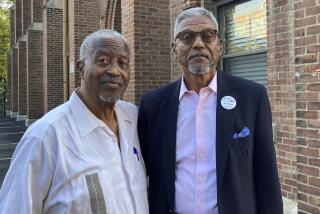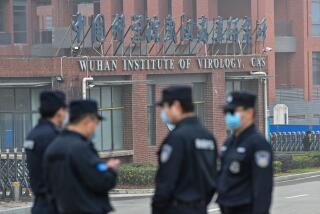Suspicious Canisters, Clues Unearthed in O.C.
- Share via
Investigators unearthed six suspicious canisters Thursday from the backyard of Dr. Larry C. Ford’s Irvine home as details emerged about the biomedical researcher’s possible one-time links to military and biological weapons programs.
The specifics of Ford’s role are unclear, but in an interview Thursday the former surgeon general of the South African Defense Force said Ford served as an “informal consultant” and provided advice on protecting military personnel against biological attacks.
Dr. Neil Knobel said that the Truth and Reconciliation Commission, a South African government panel investigating apartheid-era human rights abuses, asked about his relationship with Ford during hearings in 1998.
The commission also asked the head of a secret South African military biological weapons program whether Ford had worked with him, Knobel said, though the panel did not mention Ford’s name in any final report.
Knobel said he does not believe Ford played a role in weapons development, but another South African doctor said Ford claimed in 1995 that he had been involved in the research.
Ford is at the center of a widening probe into the attempted assassination last week of his business partner, John Patrick Riley, chief executive of Biofem Inc.
Ford committed suicide March 2, police said, a day after detectives served search warrants on his Irvine home in connection with the shooting.
The excavation in Ford’s backyard came after detectives were told by an unnamed family member that the doctor had buried weapons and biological materials on the property.
Officer Discounts Danger of Containers
Police on Thursday found six white plastic cylinders, 10 inches wide and at least 3 feet long, buried beneath a concrete slab in Ford’s backyard.
“We have dug down 3 feet and haven’t reached the other end of the cylinders, which we believe are also capped,” Irvine Police Lt. Sam Allevato said. “We don’t know what’s inside, but we believe they are filled with illegal weapons and hazardous materials.”
Once dirt is removed from around the containers, a robot from the Orange County Sheriff’s Department will be used to lift them out. The cylinders will be X-rayed at the site and then taken to a laboratory, where they will be opened, police said.
Allevato said he doesn’t believe the canisters pose a health threat.
“We believe the items [inside] to be secure,” he said. “They are in a static condition and will only be opened in a lab.”
Another 21 canisters filled with “thousands of rounds” of ammunition, including belted machine gun rounds, were found during a search of Ford’s house, Allevato said. No illegal weapons were found in the home, he said.
Police said Ford owned a number of rifles and shotguns, and ammunition for those legal weapons was found in the home. Hundreds of rifle rounds were discovered inside a closet, under a false floorboard, Allevato said.
It is unclear why Ford had the belted machine gun ammunition, illegal for a private gun collector to own. Police believe the suspected biological materials were used as part of Ford’s medical research.
Ford’s attorney said Wednesday that his client had once done work for the U.S. government on chemical weapons but didn’t know specifics.
Federal government sources said Thursday they were aware Ford had contact with the South African consulate in Los Angeles during the 1980s.
Police closed an Irvine elementary school and evacuated 48 families, about 250 residents, from the neighborhood Wednesday as a precaution. They feared that Ford might have booby-trapped some of the buried containers, but Allevato said no explosive devices were found.
The dig came more than a week after an apparent botched assassination attempt on Riley, 58, as he arrived for work at Biofem’s Irvine Spectrum offices. An unidentified gunman shot Riley once in the cheek, then fled in a van, which investigators said was driven by Los Angeles businessman Dino D’Saachs, 56, who has been charged in the case. The gunman remains at large.
Three days later, Ford returned home after meeting with his lawyer, then shot himself in an upstairs bedroom.
Riley issued a statement Thursday sympathizing with the families evacuated but declaring that his company never worked with hazardous materials.
“I am very sorry that this has caused such a disruption to your lives,” he said through a public relations company. “I want to assure everyone that the work at Biofem does not, nor has it ever in the past, involved the use of toxic materials or chemicals. Additionally, there are no toxic substances of any type involved in the creation or testing of our products.”
Biofem Had Considered Trials in S. Africa
Riley said he has been advised to “remain in seclusion for the time being. I am looking forward to a full recovery and returning to work and resuming my life.”
He said that company officials are already back at work in hopes of starting clinical trials soon on Inner Confidence, a female contraceptive suppository they believed would also hinder the spread of sexually transmitted diseases. Biofem, he added, has sufficient funds to complete tests.
Until the outbreak of violence, Biofem was a little-noted company through which Ford and Riley sought to market Inner Confidence.
One of their ideas was to conduct clinical trials in South Africa, a plan supported by Knobel, the military surgeon general who retired in 1997.
Dr. Otto Muller, a South African medical researcher, said he worked with the company to draw up plans for the trials. But Biofem never followed through, he said.
Ford had also suggested trials involving South African defense forces’ medical personnel, Muller said. But Muller rejected that idea, fearing political fallout because the mostly white military had been so discredited in the wake of apartheid.
Raymond A. Lee, the Biofem attorney, said the firm dropped the South African trials to await approval by the U.S. Food and Drug Administration, which he said would allow them to market the product globally.
The extent of Ford’s relation with the South African military is unclear. Muller said Ford told him in 1995 that he was involved in South Africa’s military-led program to develop biological weapons.
Knobel did say that Ford worked with the military during the Persian Gulf War by giving advice on a chemical-warfare protection plan for personnel stationed in Israel.
*
Times staff writer Jeff Gottlieb, researcher Salma Patel in Johannesburg and correspondent Judy Silber contributed to this report.
More to Read
Sign up for Essential California
The most important California stories and recommendations in your inbox every morning.
You may occasionally receive promotional content from the Los Angeles Times.















